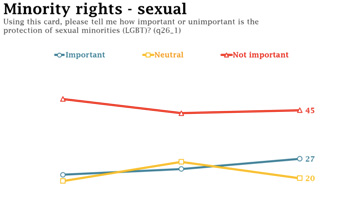NDI Poll: majority of Georgians dissatisfied with state of economy
By Levan Abramishvili
Wednesday, September 18




Data shows strong dissatisfaction about the state of the country’s economy, as in previous years. 21% of Georgians say that they are unemployed and actively looking for a job. Only a third feel they are better off economically than their parents’ generation, while almost half (43%) believe they can afford less than they could five years ago.
Half of the participants said they did not have enough money to pay for utilities at some point in the past six months, and would not be able to borrow GEL 300, without interest, if they needed to.
Only 10 percent has savings, with the highest level of savings among those in minority settlements (24%). Georgians describe prevalent economic inequality, with 70 percent saying the economy benefits only a few, and 84 percent hold the Georgian government responsible for the country’s economic problems. Almost half (48%) think that the greatest asset of Georgia’s economy is tourism.
An overwhelming majority of them (86%) says that they have a family member working abroad who regularly sends money to their family.
The number of internet users has increased in the last 5 years, with only 51% of the population using it regularly in 2015 and 64% in 2019. The number of those who have never used the internet went down from 36 to 28 in the timeframe.
Laura Thornton, NDI senior director commented on the recent poll results, saying that Georgian officials should take note of the findings and develop concrete plans aimed at inclusive growth.
“For several years, pessimism has been growing about the direction of the country, likely driven by the public’s negative evaluation of the economy, Georgians hold the government responsible for their poor economic well-being, sending an urgent signal to Georgian leaders to develop and present concrete plans for inclusive growth and employment,” said Thornton.
Healthcare remains another top concern for Georgians. While the majority of Georgians report satisfaction with the accessibility and quality of healthcare, they are concerned about the high costs of both care and medicine. Over the past year, half of the population reported that they postponed a medical treatment (54%) and were unable to buy medicine (50%) because they couldn’t afford it.
Georgians continue to demonstrate unwavering support for the country’s European and Euro-Atlantic goals, with 78 percent approving EU membership (in May 2019 polls, a total of 77 percent approved joining the EU) and 71 percent NATO membership. In addition, the vast majority (83%) believes that parliament should include at least 30 percent of women and approve of a mandatory gender quota (65%).
Also noteworthy is the finding that 4% more people agree that the rights of sexual minorities should be protected. A total of 27% of the polled people take this stance, while the same number last year was 23%.
According to the findings, people believe that it's most important to protect the rights of people with disabilities.
NDI surveys public opinion to help Georgian stakeholders diagnose and address issues of public concern by providing accurate, unbiased and statistically-sound data.
“A wide range of leaders from across the political spectrum have reported that the polls are important to their work and encourage continued polling. The results reflect data collected from July 13-29, 2019, through face-to-face interviews with a nationwide representative sample of Georgia’s adult population, excluding occupied territories, that included 2,131 completed interviews. The average margin of error is +/- 1.7 percent,” says NDI.
NDI surveys public opinion in Georgia since 2010.
The full data can be accessed at ndi.org/georgia-polls
